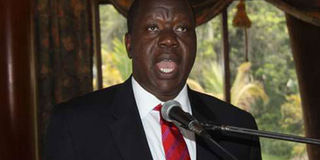Pupils in private schools to get tablets, govt says

Education Cabinet Secretary Fred Matiang'i addresses delegates at a Christian and Scientific Association of Kenya conference sponsored by Mt Kenya University at Safari Park Hotel in Nairobi on September 8, 2016. PHOTO | ANTHONY OMUYA | NATION MEDIA GROUP
What you need to know:
- Education Cabinet Secretary Fred Matiang’i has said that under the digital Literacy Programme (DLP), the government is determined to provide access and equity to all pupils whether in public or private schools.
- The Cabinet Secretary made the remarks while responding to questions during the Ministerial round table session at the ongoing Global capacity building symposium at Safari Park Hotel in Nairobi.
The provision of tablets to over 1.2 million Standard One pupils will be expanded to cover private primary schools as well.
Education Cabinet Secretary Fred Matiang’i has said that under the Digital Literacy Programme, the government is determined to provide access and equity to all pupils whether in public or private schools.
The programme aims to deliver digital learning devices to all Standard One learners in 23,951 public primary schools in the country by December this year.
Dr Matiang'i made the remarks while responding to questions during the ministerial roundtable session at the ongoing global capacity building symposium at Safari Park Hotel in Nairobi.
“There are no private children or public children. We want to erase that dichotomy,” said Dr Matiang’i.
He went on: “A parent with a child in private school also pays taxes and needs to be supported. That is why we are offering the same opportunity for both teachers in public and private schools when training teachers who will deliver in the digital literacy programme.”
The CS disclosed that more than 70,000 teachers have been trained on ICT skills to enable them teach and deliver content on a digital platform.
He said that ICT had made possible the establishment of National Open Universal University which will lead to growth and expansion of higher education.
The Jubilee government’s promise of free tablets has been delayed since 2013.
A total of 600,000 tablets are being imported from China while the rest will be assembled locally starting this month by Moi University and Jomo Kenyatta University of Science and Technology.
Part of Sh17 billion they were allocated for the project is being used to import the tablets.





